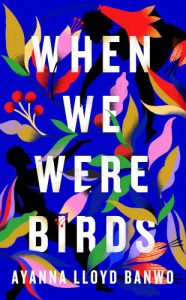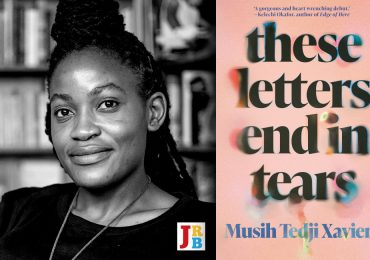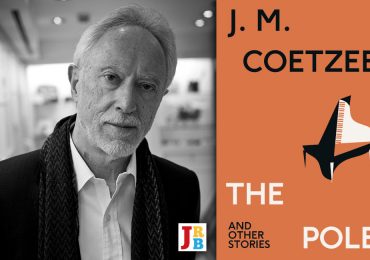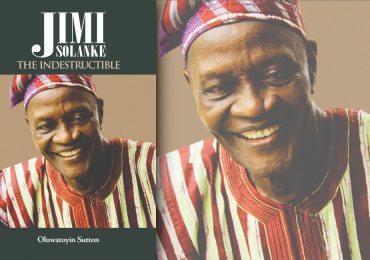Ayanna Lloyd Banwo’s debut novel When We Were Birds makes compelling work of how a world in which the living and the dead coexist can endure in enduring, if uneasy, harmony, writes Shayera Dark.

When We Were Birds
Ayanna Lloyd Banwo
Penguin, 2022
When We Were Birds is a genre-bending tale, one part magical realism, one part crime thriller, one part romance—and rendered entirely in patois. Ayanna Lloyd Banwo sets her debut novel in a fictional Trinidad, following Emmanuel Darwin and Yejide St Bernard on separate paths to self-discovery that eventually lead them to each other, thanks to their disparate connection to death.
Darwin, a phlegmatic, good-natured Rastafarian from the countryside, reluctantly takes a job as a gravedigger in the city of Port Angeles, in a bid to help Janaya, his ageing, single mother. It is a place, we are repeatedly told, known to ‘swallow a man whole’. His decision to relocate to the same city that did indeed swallow his estranged father, alongside the prospect of mingling with dead bodies—verboten in their Rastafarian faith—ruptures the close bond between mother and son. ‘I make you. You is mine. But if you leave this house to go and live in town, you not coming back,’ she warns.
But even as the line of separation deepens, with Darwin chopping off the dreadlocks he has grown since childhood, Janaya still leaves out a coconut bake for him, ‘still warm and smelling of her hands’, before he sets off to the city, demonstrating how the roots of her love run deeper even than their irreconcilable differences.
In Port Angeles, in the sprawling house perched on a hill, begotten from the ashes of a former plantation, Yejide’s mother is on the cusp of death. Unlike Darwin and Janaya, Yejide and Petronella have never been close. But like Janaya, Petronella has sought to shield her child from death, even though they are descended from a line of women necromancers tasked with maintaining the balance between the living and the dead. In the end, Fate does what it must, and Yejide’s initiation into her family’s mystical vocation proceeds—but not without resistance.
In the interim, Darwin attempts to bond with his colleagues at Fidelis, the decrepit graveyard aptly described as the ‘city of bone’. But when it dawns on him that the clique’s friendly ringleader, Errol, might have had a hand in the disappearance of a despondent widower, the camaraderie he was beginning to share with the group dissolves. Amid the mysterious happenings in Fidelis, Darwin meets Yejide, first in a dramatic vision, and then in person when she visits the cemetery’s administrative office to plan her mother’s burial. The remainder of the novel is charged with the electrifying impulses of a love-at-first-sight romance:
He search her face – skin brown, eyes dark like the longest road. Rust-red headwrap. He want to see her hair. Somehow he can’t remember if he see her hair that night. He wonder what it would smell like, feel like under his fingers, but same time he glad he can’t see it. Without it there was just her face, bare and clean like river water. And in her face – she couldn’t hide it. He know she recognise him too.
Between the pair resides the desire to blaze their own trails, the revelations of loss, and the emotional cost of contravening expectations. For Darwin, this means conniving with his alienated mother’s best friend to ensure she doesn’t spurn the money he sends her. For Yejide—whose supernatural gift feels like a suffocating curse, given she now sees others in their duality, with Death trailing the living like a shadow, and ‘with every single dead in Fidelis, across Port Angeles, all over the island, pissed as hell and want her to know it’ for resisting her calling—it means running away from everything, including her grieving, close-knit family. This decision prompts a stern reproach from her best friend, who admonishes her to honour her ancestors and assume her responsibilities:
They don’t know that death is a blessing, a balancing. That it have women living on this hill who whole life is about making sure that death don’t have to be a thing to fear, that somebody here to make sure that is nothing more than a good, long sleep. To be able to do that, to be part of that, is a blessing too.
In choosing patois to relate her story, Banwo follows in the long tradition of African writers and those of African descent deconstructing and transforming the colonial language of English into a lemonade of local variants, as capable of introspection, powerful imagery and zesty plays on words as the so-called standard form, if not more so.
When We Were Birds thrives on the tender portrait of the love between Darwin and his mother, as well as its lush, potent descriptions, such as the anger that comes off Petronella ‘like silver spikes’, or the crosses reaching out ‘like rotten fingers from the ground’. However, the narrative falters in its flat characterisations and occasionally overwrought exposition. Darwin is a predictable goody-two-shoes type, whose only flaws lie in the disagreement with his mother and his getting drunk at his coworkers’ behest, while Yejide lacks a strong defining trait beyond her powers, a blandness that also afflicts other members of her household. Her world compared to Darwin’s is tepid and heavy going, weighed down with details about her paranormal legacy.
And even when viewed through that acceptable trope the illogical but instantaneous attraction for a stranger, the romance between Darwin and Yejide feels too rushed and contrived to be realistic, and would have benefitted from a deeper, more complex exploration of the protagonists’ relationship with each other, a shortcoming perhaps arising from the novel’s relative brevity.
That said, Banwo makes compelling work of how a world in which the living and the dead coexist can endure in enduring, if uneasy, harmony. As Petronella says, ‘Fair don’t always mean good. Exchange don’t always mean peace. Power don’t always mean free.’
- Shayera Dark is a writer whose work has appeared in publications that include LitHub, Harper’s Magazine, Al Jazeera, AFREADA, The Kalahari Review and CNN.





